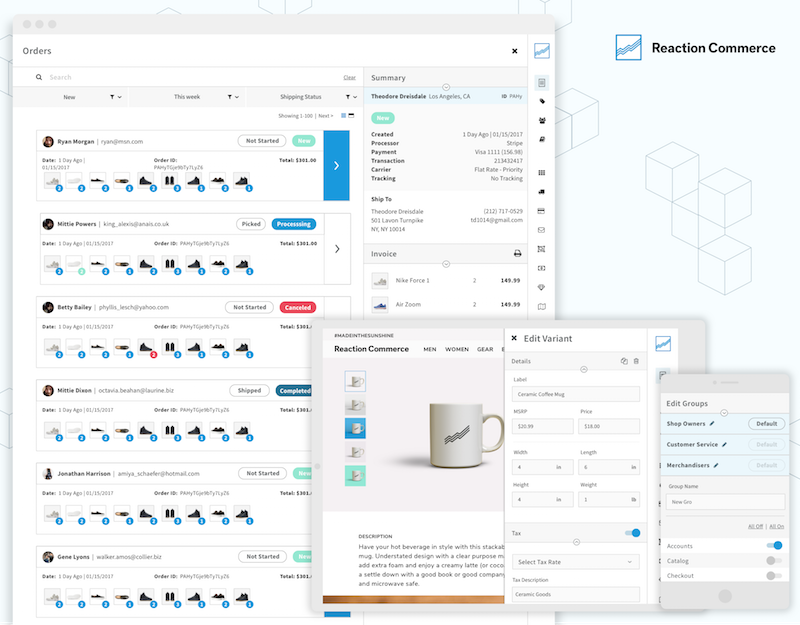Reaction is an event-driven, real-time reactive commerce platform built with JavaScript (ES6). It plays nicely with npm, Docker, and React.
Reaction’s out-of-the-box core features include:
- One step cart and checkout
- Order processing
- Payments with Stripe
- Shipping
- Taxes
- Multi-currency support
- Discounts
- Integration with dozens of third-party apps
- See full list of features on our roadmap
Since anything in our codebase can be extended, overwritten, or installed as a package, you may also develop, scale, and customize anything on our platform.
Reaction requires Meteor, Git, Mongo DB, OS-specific build tools. For step-by-step instructions, follow the documentation for OS X, Windows or Linux.
Install the Reaction CLI to get started with Reaction:
npm install -g reaction-cliCreate your store:
reaction init
cd reaction
reactionOpen localhost:3000
Learn more on how to configure your project.
Having installation issues? Check out our troubleshooting docs.
You can also run the app locally using docker-compose by running:
docker network create api.reaction.localhost
docker-compose upOpen localhost:3000
This will use the docker-compose.yml file.
To learn more on how to develop on Docker, read our documentation on developing Reaction on Docker and troubleshooting Docker.
- Reaction Commerce: Developer documentation
- Reaction Commerce: API documentation
- Reaction Commerce engineering blog posts
- Reaction Commerce YouTube videos
- Reaction Commerce Gitter chat
- Reaction Commerce forum
- Security reporting instructions: Report security vulnerabilities to mailto:security@reactioncommerce.com.
⭐ Star us on GitHub — it helps!
Want to request a feature? Use our Reaction Feature Requests repository to file a request.
We love your pull requests! Check our our Good First Issue and Help Wanted tags for good issues to tackle.
Pull requests should:
- Pass all pull request Cirlce CI checks: Run
npm run lintandreaction testto make sure you're following the Reaction Code Style Guide and passing acceptance tests and unit tests. - Follow the pull request template.
Get more details in our Contributing Guide.
We ensure that all releases are deployable as Docker containers. While we don't regularly test other methods of deployment, our community has documented deployment strategies for AWS, Digital Ocean, and Galaxy. For an introduction to Docker deployment, the Reaction deployment guide has detailed examples.
We've included a demo docker-compose file in the repository.
It shows how to use mongo as a service with your Reaction app. It can be used to do a demo of your production build by running this command:
docker-compose -f docker-compose-demo.yml upYou can also use this file as starting point for your production docker-compose setup.
You can check our latest release in Heroku by simply clicking the button below. You will need to create a Heroku account if you do not have one yet or log in using an existing account.
Copyright © GNU General Public License v3.0
